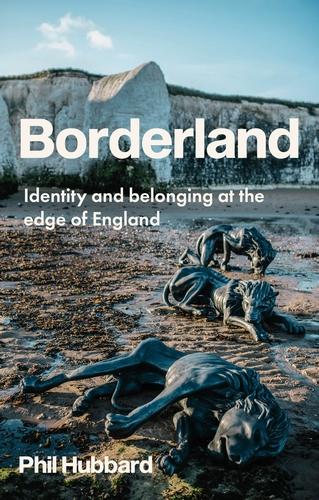Book Review – November 2022
What could I say about borders and bordering that would help others make sense of Brexit? My mind raced through the different forms of exclusionary nationalism – social, cultural, political, environmental – that I had witnessed, and my emerging conviction that Britain was turning away from Europe at a time of immanent and inescapable global change that requires cooperation, not isolationism.
As I sit down to write this review the news is full of reports about small boats making the perilous journey across the English Channel. Families, many of them with small children, fleeing war and oppression. Young men and women seeking a better life, eager to fill some of the UK’s many unfilled job vacancies and pay taxes into our depleted exchequer. Witness also the frenzy of hostility being whipped up by sections of the press and social media. The spectacle of a Home Secretary, herself the child of economic migrants, characterising the arrival of these clutches of bedraggled and bewildered people as an ‘invasion’, as if to invoke the spirit of an island fortress with the Kent coast as its front line.
Borderland was born out of a series of journeys made on foot by Phil Hubbard in 2019. A native of Kent now based elsewhere, Hubbard wanted to explore the county’s coastline from the Thames and the North Kent Marshes down to Dungeness and the Sussex border in the south. It is a coastline configured by Britain’s relationship with continental Europe and is subject to the ebb and flow of relations between the two sides of the Channel; periods of antagonism followed by periods of ‘entente cordiale’ and closer ties. Hubbrd highlights how, during times of strained relationships such as the present, Kent’s coast is presented by some as the imagined battleground where a number of national myths are played out.
But the myth of England’s ‘green and pleasant land’ does not encompass the rest of the UK, nor even all of England. Rather it refers to a cosy southern English rural idyll as imagined, for instance, in H.E. Bates’s The Darling Buds of May, and in particular in the 1990s TV adaptation. But behind the idyll Hubbard discovers pockets of extreme poverty and deprivation along the Kent coast. He charts examples of precarious lifestyles affecting locals and refugees alike.
But there is also affluence. Whitstable, once just a working town centred on the oyster trade, has now been gentrified by wealthier ‘down from London’ people (DFLs) who are driving up property prices and encouraging the proliferation of high-end restaurants and shops. Margate too, while it still has its share of deprivation, has moved up market with a revival in the town’s fortunes stimulated by the art market. Thanet and Sheppey, however, continue to suffer with the problems brought about by low incomes, limited expectations and poor infrastructure.
Hubbard pays particular attention to Dover and Folkstone as this stretch of the coast is both the main arrival point for refugee boats and the centre of activity for anti-migrant activists, and more recently a far-right terror incident. This area, and Dover in particular, has suffered from the decline of the ferry business. Despite efforts to stimulate tourism by highlighting the town’s military history, Hubbard suggests that this is still a place with an uncertain future.
Further along the coast, around Romney Marsh, Hubbard gains a sense of an older, rural and more isolated Kent. Near the end of his final walk, in the area around Dungeness, he describes a totally unique landscape, one that is bursting with hauntological resonances. The gloomy, bunker-like nuclear power station dominates this stretch of coast. but Hubbard also finds sunnier, more optimistic expressions of the human spirit. Derek Jarman’s former home, and particularly its shingle garden, still possesses the power to move those who visit it. This is, as Jarman himself once wrote, a ‘landscape of past endeavours’. Joe Sweeney’s installation, using an old BT call box, is called Leave a Message for Europe and marks the end of Hubbard’s journey and prompts him to reflect on what he has seen and experienced and what the future might hold for Kent’s coast.
Borderland is a hugely engaging read and offers some profound insights into the past and present of Kent’s coastline and, by extension, of England as a whole. Hubbard examines the myths we summon up to explain our national past together with the malleability of memory and how some will seek to exploit that. This is neither an academic textbook nor a straightforward travel guide. Instead, in a short but cogent review of what he terms the ‘new nature writing’, he clearly seems to wish to ally himself with this approach. As he explains:
Much of this writing disrupts any neat binary between nature and culture. Indeed, the work that has been placed in the genre of ‘new nature writing’ often focuses on the relationship between landscape, place and people. It tells a story that is personal and political, often using autobiography as a tool for environmental critique.
Phil Hubbard
 Phil Hubbard is Professor of Urban Studies at King’s College London. He has published widely on questions of class, gentrification and the impacts of urban policy on socially marginalised populations. His books include Cities and Sexualities, The Battle for the High Street, and Key Ideas in Geography: City.
Phil Hubbard is Professor of Urban Studies at King’s College London. He has published widely on questions of class, gentrification and the impacts of urban policy on socially marginalised populations. His books include Cities and Sexualities, The Battle for the High Street, and Key Ideas in Geography: City.



Ooh, as a Kent native, this is going straight on my wishlist if it isn’t there already. I’m from West Kent, the affluent, weirdly monocultural bit but have spent time on the coast at various points, too.
Thanks Liz, it’s definitely worth seeking out. I don’t know the Kent coast very well, but I spent a few days in Sheerness many years ago. It’s a decidedly odd place and I still have very vivid memories of it. Patrick Wright’s book captures the essence of the place very well.